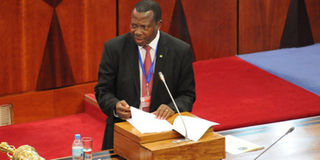It’s 60pc budget miss

The Minister for Finance and Planning, Dr Philip Mpango, when presenting the 2017/18 Budget framework yesterday, indicated that development funding will increase by 7.4 per cent over this financial year’s, to the tune of Sh31.69 trillion.
What you need to know:
- The Minister for Finance and Planning, Dr Philip Mpango, when presenting the 2017/18 Budget framework yesterday, indicated that the budget will increase by 7.4 per cent over this financial year’s, to the tune of Sh31.69 trillion.
Dodoma. The government has explained why it has released only 34 per cent of the development funds for the current financial year, citing delays in loans and grants from development partners as one of the factors.
The Minister for Finance and Planning, Dr Philip Mpango, when presenting the 2017/18 Budget framework yesterday, indicated that the budget will increase by 7.4 per cent over this financial year’s, to the tune of Sh31.69 trillion.
The current budget estimates stand at Sh29.5 trillion as approved by the Parliament last June.
However, he said, up to February this year, the government had released only Sh3.97 trillion out of the Sh11.8 trillion approved by Parliament last June.
Dr Mpango said some of the funds were directed to paying debts in the development projects but were accounted in the recurrent expenditure books.
“Some funds were delayed because talks with development partners took too long to mature and interest rates had increased from six per cent in July to nine per cent in September in the international market. That forced the government to avoid borrowing,” said Dr Mpango.
“This was not only in Tanzania as other African countries faced this challenge as well,” he noted.
The government also planned to borrow Sh2.1 trillion from the international commercial sources but it didn’t due to increase in interest rates in the international markets.
However, he was optimistic that the borrowing market was improving in Europe and so far the government has signed an agreement worth $51 million with Kuwait Fund and soon it will sign agreements with OPEC Fund ($18 million) and Abu Dhabi Fund for Development ($15 million).
The government is also talking with UK’s Credit Suisse for $300 million for development projects. It is also having discussions with other financial institutions like Barclays Bank, HSBC and Citi Bank.
REVENUE POLICY
Dr Mpango said the government would increase domestic revenue to 15.9 per cent of the GDP and improve tax revenue to 14.1 per cent of the GDP.
The government also wants to reduce the budget deficit from the current level of 4.5 per cent of the GDP to 3.8 per cent in the financial year 2017/18.
PRIORITIES
In the next fiscal year estimates, the government plans to finance the infrastructure upgrading and implementation of its industrialisation drive.
Without disclosing the specific amount for every sector, Dr Mpango outlined government priorities including the upgrading of the central railway line to standard gauge, reviving the national carrier, Air Tanzania Company Ltd, and development of Liganga Iron Mine and Mchuchuma Coal Mine.
Other priorities include establishment of special economic zones in Tanga, Bagamoyo, Kigoma, Ruvuma and Mtwara.
Another priority area is the development of Mkulazi Sugar Plant in Morogoro which is being undertaken by the NSSF and the PPF.
Then, there will be the issue of further compensating those whose properties have been affected by the land taken up to pave the way for the construction of the liquefied natural gas (LNG) in Lindi infrastructure.
He revealed that the government has signed contract for four more aircraft which will cost $231.3 million. According to him, initial payment of Sh56.89 billion was effected and one aircraft is expected in July 2017.
He said two others would arrive in the country in June 2018 and another in July of the same year.
The government also put it in its priority list the programme of relocating to Dodoma.
Some of the challenges facing the current budget include low awareness on the part of tax payers, especially with regard to electronic fiscal devices; delay in getting soft loans and talks with development partners taking too long to mature.
Furthermore, in the next Budget, the government will increase tax revenue from the current target of Sh15 trillion to Sh17.1 trillion, said Dr Mpango.
Development expenditure is planned to stand at Sh11.99 trillion while the recurrent budget will be Sh19.7 trillion.
A total of Sh3.97 trillion is expected to come from foreign sources including the general budget support, project finance and sectoral basket funding.




